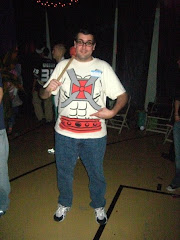Yes, the work I did was quite tedious, but in case any of my coworkers are reading this I'll repeat something I've said many times to people: I don't like my work, but I really like my job. My job lets me set my own hours; my job is largely stress free; my job allows me to work virtually unsupervised while I listen to music; my job has decent benefits; best of all, my job got me a free trip to New York. But my work...well, let's take a look.

After I climbed the stairs, I came into my little cave/office to sweat. There was often a lot of sweat--New York is much more humid than what I'm used to--but fortunately nobody could see me. To prevent outside light from affecting the quality of the scans I was getting, I had to cover all of the windows in my office with black construction paper. The lights were controlled from outside the room, so the light bulbs had to be removed too, leaving my computer monitors and big, hot photography lights (I think they were 1ks) as my only light sources. I never really met anyone that worked in the outer office area (the people I worked with were in a different library, they just stuck me where they had space), not even the cute girl with the prosthetic leg. If I somehow knocked myself unconscious or had a heart attack or something, it might have been a really long time before my body was discovered. Even the janitors were instructed to stay out, so we wouldn't have to risk them bumping the equipment.

Here's a wide shot of the scanning area, including the aforementioned lights. My friend Nicole used this same office a year earlier for our first project with Columbia, and she had four lights. Two was hot enough; it must have been pretty bad for her.

This little fan helped, though. As you can see, I keep my wires nice and tidy.

This is the camera I used. On the right you can see the firewire cable, which for a few weeks I had dangling in front of the light, leaving a small shadow on the images that I somehow didn't notice. I had to redo about eight days' work.

Most of the stuff I scanned were bound volumes, so I had to use this book cradle. I'd lift the glass, position the page, lower the glass, take a picture, raise the glass, turn the page, lower the glass...I did this for about 40,000 pages, not counting the ones I had to redo. Yes, it is as monotonous as it sounds. I really enjoyed using the plunger to take pictures at first (I felt like a Sears photographer!), but that novelty wore off by about the third day.

Here's the original piece of glass from the cradle. I broke it in January, and for about 24 hours I was freaking out, thinking I was going to be sent home. They had a spare piece back in Provo, so no major harm done.

My two computers, where I checked the scans I took and created spreadsheets to keep track of the files.

It was the first time I'd ever used a Mac extensively. I'm not a fan. I fear change, plus I'm a big John Hodgman fan.

Good old PC. As you can see, 40,000 images requires many, many hard drives. All this equipment would later be joined by two flatbed scanners that I used to scan a few thousand loose pages. Someone in the Provo office labelled each scanner with a name from the Twilight books. Oh, Bella, why did you jam so much more often than Jacob?

This is the fireproof cabinet I kept the archival documents I was scanning in. Maybe in the next movie, Indiana Jones can climb into one of these when he needs to survive a nuclear blast in a far-fetched way.

Inside the cabinet. Those books were old, some dating back to the 1860s. Just a bunch of corporate reports--end of the year balance sheets and the like. I have no idea who needs access to these things, why these were the items chosen out of millions owned by Columbia for me to scan, but I'd better get some credit in some Econ major's thesis.
Now, you all know why I haven't ever written much about the work I did in New York. You're welcome.

3 comments:
Wow. You just answered a lot of questions I've had since late last year. I don't know what we'll talk about now when we get together for burgers.
Thanks for the Huey Lewis reference. They are seriously underrated. And so is Huey's hair.
You're right, Jeff. 4 lights were extremely hot in that little office! And the air conditioning being frequently in and out of operation when the weather started warming up wasn't very helpful either...
Thanks for recognizing the Huey Lewis reference.
Post a Comment